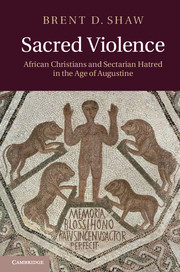Book contents
- Frontmatter
- Contents
- Abbreviations
- Maps
- Acknowledgments
- Introduction
- Chapter 1 This terrible custom
- Chapter 2 Church of the traitors
- Chapter 3 A poisonous brood of vipers
- Chapter 4 Archives of memory
- Chapter 5 The city of denial
- Chapter 6 Ravens feeding on death
- Chapter 7 Little foxes, evil women
- Chapter 8 Guardians of the people
- Chapter 9 In the house of discipline
- Chapter 10 Sing a new song
- Chapter 11 Kings of this world
- Chapter 12 We choose to stand
- Chapter 13 Athletes of death
- Chapter 14 Bad boys
- Chapter 15 Men of blood
- Chapter 16 Divine winds
- Chapter 17 So what?
- Appendix A Bishops and bishoprics in Africa: the numbers
- Appendix B Origins of the division: chronology
- Appendix C The Catholic conference of 348
- Appendix D The Edict of Unity and the Persecution of 347
- Appendix E The mission of Paul and Macarius
- Appendix F Historical fictions: interpreting the circumcellions
- Appendix G The archaeology of suicide
- Appendix H African sermons
- Bibliography
- Index
- References
Chapter 13 - Athletes of death
Published online by Cambridge University Press: 07 September 2011
- Frontmatter
- Contents
- Abbreviations
- Maps
- Acknowledgments
- Introduction
- Chapter 1 This terrible custom
- Chapter 2 Church of the traitors
- Chapter 3 A poisonous brood of vipers
- Chapter 4 Archives of memory
- Chapter 5 The city of denial
- Chapter 6 Ravens feeding on death
- Chapter 7 Little foxes, evil women
- Chapter 8 Guardians of the people
- Chapter 9 In the house of discipline
- Chapter 10 Sing a new song
- Chapter 11 Kings of this world
- Chapter 12 We choose to stand
- Chapter 13 Athletes of death
- Chapter 14 Bad boys
- Chapter 15 Men of blood
- Chapter 16 Divine winds
- Chapter 17 So what?
- Appendix A Bishops and bishoprics in Africa: the numbers
- Appendix B Origins of the division: chronology
- Appendix C The Catholic conference of 348
- Appendix D The Edict of Unity and the Persecution of 347
- Appendix E The mission of Paul and Macarius
- Appendix F Historical fictions: interpreting the circumcellions
- Appendix G The archaeology of suicide
- Appendix H African sermons
- Bibliography
- Index
- References
Summary
The blood of the martyrs was the vital force, the kinetic energy powering Christian life in Africa. For believers, the blood sacrifice of their noble men and women was the foundation of Christian truth. The blood of the martyrs was collected, remembered, venerated, worshiped. The spilled blood of the Christian witness was liquid soul. Possessing the blood of the martyr was like having the DNA, the code to a higher existence. The sanctified blood of martyrs had been shed by Florus, the praesidial governor of Numidia in the Great Persecution, in 304, when he murdered Christians at Milevis in “the days of turification.” Their gore was taken up, preserved, and carefully distributed to nearby towns, like Mastar, some fifteen miles to the southeast, where it was deposited to mark the place as holy ground made sacred by the martyrs’ blood. The days when the governor came to towns like Milevis with the demand that the Christians turificate – to burn incense to the gods – were traumatic ones. True Christians would have to refuse. In the hearing held by Secundus, the Primate of Numidia, in May 306, concerning the status of the clergy who had ordained the bishop Silvanus at Cirta, the stark division for people in these local communities was between the martyrs who had remained loyal and the traitors who had not.
Secundus to Donatus from Masculula: “It is said that you betrayed.” [i.e. handed scripture to the authorities]
Donatus: “You know how often Florus asked me to turificate [i.e. to burn incense to the gods] and, my brother, God did not betray me into his hands. And since God Himself has released me, I ask you to save me for God's judgment.
Secundus: “In that case, what are we to do with the martyrs? Because they did not betray [i.e. the Word of God], they were crowned.”
Donatus: “Send me before God and I will give a full accounting to Him of my actions.”
If traitors like Donatus were to be excused, the bishop Secundus wondered aloud, then what was to become of the martyrs? After all, it was their blood that had laid down the marker, the standard of courage required of true believers.
- Type
- Chapter
- Information
- Sacred ViolenceAfrican Christians and Sectarian Hatred in the Age of Augustine, pp. 587 - 629Publisher: Cambridge University PressPrint publication year: 2011

